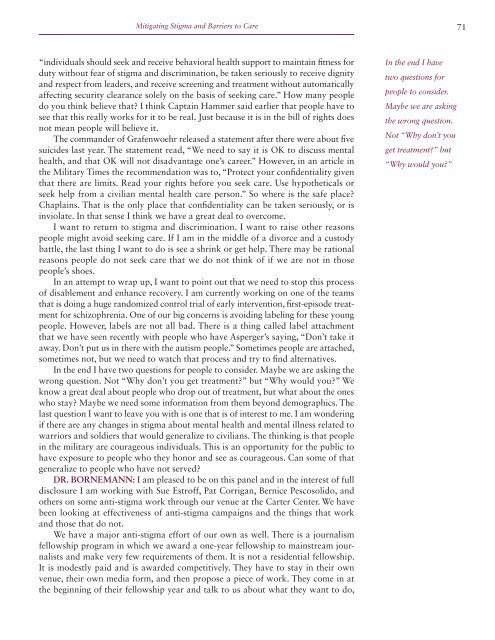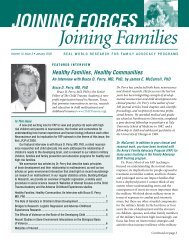stigma and barriers to care - Uniformed Services University of the ...
stigma and barriers to care - Uniformed Services University of the ...
stigma and barriers to care - Uniformed Services University of the ...
Create successful ePaper yourself
Turn your PDF publications into a flip-book with our unique Google optimized e-Paper software.
Mitigating Stigma <strong>and</strong> Barriers <strong>to</strong> Care 71<br />
“individuals should seek <strong>and</strong> receive behavioral health support <strong>to</strong> maintain fitness for<br />
duty without fear <strong>of</strong> <strong>stigma</strong> <strong>and</strong> discrimination, be taken seriously <strong>to</strong> receive dignity<br />
<strong>and</strong> respect from leaders, <strong>and</strong> receive screening <strong>and</strong> treatment without au<strong>to</strong>matically<br />
affecting security clearance solely on <strong>the</strong> basis <strong>of</strong> seeking <strong>care</strong>.” How many people<br />
do you think believe that I think Captain Hammer said earlier that people have <strong>to</strong><br />
see that this really works for it <strong>to</strong> be real. Just because it is in <strong>the</strong> bill <strong>of</strong> rights does<br />
not mean people will believe it.<br />
The comm<strong>and</strong>er <strong>of</strong> Grafenwoehr released a statement after <strong>the</strong>re were about five<br />
suicides last year. The statement read, “We need <strong>to</strong> say it is OK <strong>to</strong> discuss mental<br />
health, <strong>and</strong> that OK will not disadvantage one’s <strong>care</strong>er.” However, in an article in<br />
<strong>the</strong> Military Times <strong>the</strong> recommendation was <strong>to</strong>, “Protect your confidentiality given<br />
that <strong>the</strong>re are limits. Read your rights before you seek <strong>care</strong>. Use hypo<strong>the</strong>ticals or<br />
seek help from a civilian mental health <strong>care</strong> person.” So where is <strong>the</strong> safe place<br />
Chaplains. That is <strong>the</strong> only place that confidentiality can be taken seriously, or is<br />
inviolate. In that sense I think we have a great deal <strong>to</strong> overcome.<br />
I want <strong>to</strong> return <strong>to</strong> <strong>stigma</strong> <strong>and</strong> discrimination. I want <strong>to</strong> raise o<strong>the</strong>r reasons<br />
people might avoid seeking <strong>care</strong>. If I am in <strong>the</strong> middle <strong>of</strong> a divorce <strong>and</strong> a cus<strong>to</strong>dy<br />
battle, <strong>the</strong> last thing I want <strong>to</strong> do is see a shrink or get help. There may be rational<br />
reasons people do not seek <strong>care</strong> that we do not think <strong>of</strong> if we are not in those<br />
people’s shoes.<br />
In an attempt <strong>to</strong> wrap up, I want <strong>to</strong> point out that we need <strong>to</strong> s<strong>to</strong>p this process<br />
<strong>of</strong> disablement <strong>and</strong> enhance recovery. I am currently working on one <strong>of</strong> <strong>the</strong> teams<br />
that is doing a huge r<strong>and</strong>omized control trial <strong>of</strong> early intervention, first-episode treatment<br />
for schizophrenia. One <strong>of</strong> our big concerns is avoiding labeling for <strong>the</strong>se young<br />
people. However, labels are not all bad. There is a thing called label attachment<br />
that we have seen recently with people who have Asperger’s saying, “Don’t take it<br />
away. Don’t put us in <strong>the</strong>re with <strong>the</strong> autism people.” Sometimes people are attached,<br />
sometimes not, but we need <strong>to</strong> watch that process <strong>and</strong> try <strong>to</strong> find alternatives.<br />
In <strong>the</strong> end I have two questions for people <strong>to</strong> consider. Maybe we are asking <strong>the</strong><br />
wrong question. Not “Why don’t you get treatment” but “Why would you” We<br />
know a great deal about people who drop out <strong>of</strong> treatment, but what about <strong>the</strong> ones<br />
who stay Maybe we need some information from <strong>the</strong>m beyond demographics. The<br />
last question I want <strong>to</strong> leave you with is one that is <strong>of</strong> interest <strong>to</strong> me. I am wondering<br />
if <strong>the</strong>re are any changes in <strong>stigma</strong> about mental health <strong>and</strong> mental illness related <strong>to</strong><br />
warriors <strong>and</strong> soldiers that would generalize <strong>to</strong> civilians. The thinking is that people<br />
in <strong>the</strong> military are courageous individuals. This is an opportunity for <strong>the</strong> public <strong>to</strong><br />
have exposure <strong>to</strong> people who <strong>the</strong>y honor <strong>and</strong> see as courageous. Can some <strong>of</strong> that<br />
generalize <strong>to</strong> people who have not served<br />
DR. BORNEMANN: I am pleased <strong>to</strong> be on this panel <strong>and</strong> in <strong>the</strong> interest <strong>of</strong> full<br />
disclosure I am working with Sue Estr<strong>of</strong>f, Pat Corrigan, Bernice Pescosolido, <strong>and</strong><br />
o<strong>the</strong>rs on some anti-<strong>stigma</strong> work through our venue at <strong>the</strong> Carter Center. We have<br />
been looking at effectiveness <strong>of</strong> anti-<strong>stigma</strong> campaigns <strong>and</strong> <strong>the</strong> things that work<br />
<strong>and</strong> those that do not.<br />
We have a major anti-<strong>stigma</strong> effort <strong>of</strong> our own as well. There is a journalism<br />
fellowship program in which we award a one-year fellowship <strong>to</strong> mainstream journalists<br />
<strong>and</strong> make very few requirements <strong>of</strong> <strong>the</strong>m. It is not a residential fellowship.<br />
It is modestly paid <strong>and</strong> is awarded competitively. They have <strong>to</strong> stay in <strong>the</strong>ir own<br />
venue, <strong>the</strong>ir own media form, <strong>and</strong> <strong>the</strong>n propose a piece <strong>of</strong> work. They come in at<br />
<strong>the</strong> beginning <strong>of</strong> <strong>the</strong>ir fellowship year <strong>and</strong> talk <strong>to</strong> us about what <strong>the</strong>y want <strong>to</strong> do,<br />
In <strong>the</strong> end I have<br />
two questions for<br />
people <strong>to</strong> consider.<br />
Maybe we are asking<br />
<strong>the</strong> wrong question.<br />
Not “Why don’t you<br />
get treatment” but<br />
“Why would you”




